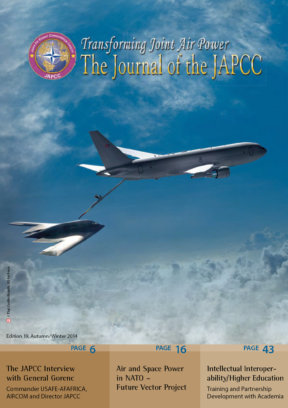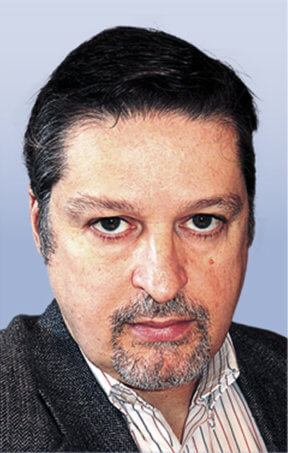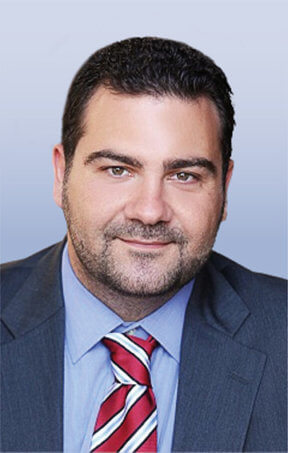Introduction
The purpose of this article is to present a recent survey of the necessity of language skills. The primary investigation shows the current capabilities and proposes issues for consideration. As English is one of the two official NATO languages, we believe an improved and direct language skill method of teaching should be used. Language skills are of utmost importance for interoperability at all levels and therefore an important tool for strategic, operational, tactical and every day deliverables, whether in the military or civilian domain. This is extremely important for the Air & Space domain, since by its very nature, it is a combined endeavour where multinational cooperation is a conditio sine qua non. This article reflects the initial result of a preliminary study and address questions regarding the importance of the English language as a tool for NATO capabilities. The correct use of language and its understanding enables a successful administrative and operational environment. It avoids possible misunderstandings or misinterpretations across the whole spectrum of military activities and avoids duplication of efforts in NATO operations and / or NATO working environments.
The study in this article as aforementioned is in its initial research steps. Primary sources of information are presented henceforth, through an established questionnaire that will be evaluated and analysed. The questionnaire was created in order to investigate possible ‘flaws’ in the use of English in NATO. We evaluate this through people’s (military and civilian) experiences and professional capacities. We question whether they deem the technical and everyday use of English as a working language in NATO as necessary and evaluate the importance they assign to using it properly. Finally, we examine how language is used to ‘get the message through’. This article demonstrates the necessity for structural changes in how English language skills are taught and evaluated and recommends improvements.
Although this work is ongoing and currently only reaches the first level of the problem, we hope it eventually enables all members of NATO and people engaged at international or peripheral organizations to evaluate their national or multinational frameworks of language preparations, abilities and skills in what we will call a ‘smarter’ way. We believe that a perfect working use of English at NATO is a realistic strategic move; an administrative tool that when correctly applied or presented, can only produce success. In such a way, NATO’s administrative, communicative and marketing abilities can be achieved at the same high levels NATO’s strategic, operational and tactical capabilities reach. Professional training in key aspects and wording of the English language allows members to better engage their audience, gain knowledge more easily and use communication tools more effectively.
The necessity of this paper is consequential in several issues that we experienced. We deliver this research article based on professional observations coming from both authors. Needless to say our joined information is cross examined from two separate points of views and experiences.
Our statement is clear: the linguistic capabilities and capacities of non-native speakers, used as tools for deliverables, whether administrative or operational are a severe shortcoming in NATO. Also, there are many missing elements for capacity-building in language training. Ill-equipped personnel and ill-equipped training methods for those who teach the language may not provide the necessary outcome. For those that wish to lead, command, administrate or work in an everyday business to business environment, poor use of English can negatively affect the person and / or leader in operational / administrative purposes. There is a need for capacity-building in language skills for those who do not meet the language skill requirements for the job. This can only be achieved if all Alliance members put more effort in their national level English language training. Only then will we achieve robust results that can have an effective and positive influence.
Objectives of the Survey
The objectives of the survey are twofold; first, to show that the Standardized Language Profiles (SLP) are often unrealistic and, at the same time, show shortfalls in some areas in the military members’ proficiency levels in the four skills. Early testing shows that nations are not very well acquainted with joined or interoperable testing procedures for their personnel posted to NATO. Research shows that Level 3s and especially Level 4s should have no problems with listening comprehension which evidently is not the case. It is our objective to show why this is done and to analyse the validity of this argument.
Framework of Information
The basis of the Questionnaire was associated with past work conducted by the Romanian National Defense Foreign Languages Testing Center in Bucharest. Its validity in terms of time is quite recent (December 2013 to February 2014) and its technical questions are a continued source of constant evaluation of the difficulties associated with professional work at NATO.
The questionnaire was distributed to 50 military personnel, with only 15 replies, equating to a 30 % participation rate. This is a small sample; however, it shows a fair representation of NATO military members ranging from senior NCOs to a flag officer. The distribution of the questionnaire was provided through electronic mail. The majority of Departments that saw the questionnaire were non-native English speakers. The questionnaire was not anonymous and includes profiles of military and administrative personnel. Questions are synonymous to NATO operational needs and evaluations for capability building.
The methodological approach is quite simple in this questionnaire. We considered past questions and raised new ones which we believe can be helpful. The questionnaire was based on the Romanian report in 2006 that aimed to evaluate what levels of English proficiency were required by NATO, in accordance with Standardization Agreement (STANAG) 6001, for the Romanian deployable forces as opposed to what levels were actually needed based on the experience of their soldiers who had participated in previous international missions.
Validity of Questions
The questions put forward to the deployable military members were based on 32 experience and mission related tasks. The questions addressed the four skills (listening, speaking, reading and writing) and ascertained which tasks they were required to perform most, their anticipated difficulty, how frequently they performed well or badly and how important they deemed these tasks to be in their daily duties during deployment. A first self-assessment for each task was also provided.
Data
For writing, the main task overall was to write notes, memos and e-mails (SLP 2 task) with 86 % stating that this was required and was performed quite frequently.
For tasks that require SLP 3 in writing, 60 % said that they are required to fulfil these tasks on an infrequent basis, and one-third found these tasks quite difficult.
Just above half (53 %) found the listening comprehension tasks (most of them SLP 2 tasks) not difficult, while some who had STANAG 6001 test SLP 3s and a 4 in listening comprehension found some of the tasks difficult.
Early Proposals
Pedagogy is a tool for constant knowledge. It not only supports arguments for a much better and successful ability to teach but also to constantly learn. The methodology of learning a language should continue to be evaluated. Language examinations should become smarter in multiple ways and levels while providing a standardized framework system of joined training on language preparation of English for NATO posts. Language training should reflect real needs and necessary knowledge that should come attached with the position at hand.
At an early stage, we recommend that structural changes should occur. They should be policy oriented and technical in terms of learning, teaching and examining. All matters should hold a positive impact in the method applied and used for teaching. A new oral and written way of English training should be considered.
Policy oriented proposals reflect four aspects that we need to consider:
- Teaching and learning methodology of English as a working / professional language.
- Operational preparation that differs in technical levels and research and development affairs.
- Examination methods (how to evaluate and how to teach).
- Creation of mid-career evaluation (constant evaluation methodology and possible comments that may lead to structural changes).
Conclusion
These findings are merely the tip of the iceberg, however should be considered as the basis of a way forward. NATO must become more involved in the training of national English language teachers as well as those who test English language proficiency in accordance with STANAG 6001. There is no official NATO test but merely national interpretations of the language levels outlined in STANAG 6001 and often one nation’s Level 2 is another nation’s Level 3. Allied Command Transformation (ACT), the command responsible for education and training, financially supports language testing seminars held at the George C. Marshall Center in Germany, but they do not even have the means to test their own personnel. Only Supreme Headquarters Allied Powers Europe (SHAPE) has a testing team and regularly tests newly assigned personnel to the command.
Linguistic capabilities and capacities of non-native speakers need to be improved now that NATO has entered a new era of more extensive multinational cooperation. Especially in the Air & Space domain, this cooperation pervades the tactical level, which until recently was a purely national environment. Language use has to be seen as a crucial tool for interoperability at all levels. To achieve this, both training and testing procedures should be evaluated. The methodological approach should be simplified, in offering joined combine training as a prerequisite. It will provide quality assurance and will lead the way to improved capacity-building at all levels in changing times to face not only external threats but also to construct a solid framework for robust administrative results that NATO requires.
On the other side of the coin, the language proficiency levels for international personnel assigned to the NATO structure are not the only problem. Too often the levels required for these posts are at a much higher level than the actual requirement. One example would be requiring a Norwegian OR4 clerk to have a mandatory SLP 3333. The level is remarkably much higher than what the duties require. This can also be said for most staff officers who require SLP 3333 regardless of what they are required to do in their day-to-day work. Within Allied Command Operations (ACO) a full Colonel requires SLP 4343 only because he is a full Colonel.
This problem has been addressed and in the near future a Language Needs Assessment (LNA) will be carried out at both ACO and ACT where a team of the Bureau for International Language Coordination (BILC), a NATO consultancy body, will do just that in order to tackle this problem and advise the organizations on how to remedy this problem.
NATO focuses on many areas, but it’s amazing that the ability to communicate effectively has been overlooked for a very long time. Former United States Chairman of the Joint Chiefs of Staff, General John W. Vessey, probably said it best when he addressed this issue almost 30 years ago stating that ‘more has been screwed up on the battlefield and misunderstood in the Pentagon because of the lack of understanding of the English language than any other single factor’.













